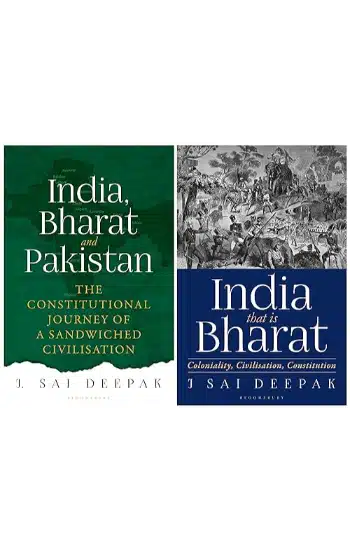Set of 2 Books by J. Sai Deepak – India, Bharat and Pakistan & India that is Bharat: Coloniality, Civilisation, Constitution
Publisher:
| Author:
| Language:
| Format:
Publisher:
Author:
Language:
Format:
₹1,798 ₹1,349
Save: 25%
In stock
Ships within:
In stock
| Book Type |
|---|
ISBN:
Page Extent:
India, That Is Bharat, the first book of a comprehensive trilogy, explores the influence of European ‘colonial consciousness’ (or ‘coloniality’), in particular its religious and racial roots, on Bharat as the successor state to the Indic civilisation and the origins of the Indian Constitution. It lays the foundation for its sequels by covering the period between the Age of Discovery, marked by Christopher Columbus’ expedition in 1492, and the reshaping of Bharat through a British-made constitution-the Government of India Act of 1919. This includes international developments leading to the founding of the League of Nations by Western powers that tangibly impacted this journey. Further, this work also traces the origins of seemingly universal constructs such as ‘toleration’, ‘secularism’ and ‘humanism’ to Christian political theology. Their subsequent role in subverting the indigenous Indic consciousness through a secularised and universalised Reformation, that is, constitutionalism, is examined. It also puts forth the concept of Middle Eastern coloniality, which preceded its European variant and allies with it in the context of Bharat to advance their shared antipathy towards the Indic worldview. In order to liberate Bharat’s distinctive indigeneity, ‘decoloniality’ is presented as a civilisational imperative in the spheres of nature, religion, culture, history, education, language and, crucially, in the realm of constitutionalism.
India, Bharat and Pakistan, the second book of the Bharat Trilogy, takes the discussion forward from its bestselling predecessor, India That Is Bharat. It explores the combined influence of European and Middle Eastern colonialities on Bharat as the successor state to the Indic civilisation, and on the origins of the Indian Constitution. To this end, the book traces the thought continuum of Middle Eastern coloniality from the rise of Islamic Revivalism in the 1740s following the decline of the Mughal Empire, which presaged the idea of Pakistan, until the end of the Khilafat Movement in 1924, which cemented the road to Pakistan. The book also describes the collaboration of convenience that was forged between the proponents of Middle Eastern coloniality and the British colonial establishment to the detriment of the Indic civilisation. One of the objectives of this book is to help the reader draw parallels between the challenges faced by the Indic civilisation in the tumultuous period from 1740 to 1924, and the present day. Its larger goal remains the same as that of the first, which is to enthuse Bharatiyas to undertake a critical decolonial study of Bharat’s history, especially in the context of the Constitution, so that the religiosity towards the document is moderated by a sense of proportion, perspective and purpose
India, That Is Bharat, the first book of a comprehensive trilogy, explores the influence of European ‘colonial consciousness’ (or ‘coloniality’), in particular its religious and racial roots, on Bharat as the successor state to the Indic civilisation and the origins of the Indian Constitution. It lays the foundation for its sequels by covering the period between the Age of Discovery, marked by Christopher Columbus’ expedition in 1492, and the reshaping of Bharat through a British-made constitution-the Government of India Act of 1919. This includes international developments leading to the founding of the League of Nations by Western powers that tangibly impacted this journey. Further, this work also traces the origins of seemingly universal constructs such as ‘toleration’, ‘secularism’ and ‘humanism’ to Christian political theology. Their subsequent role in subverting the indigenous Indic consciousness through a secularised and universalised Reformation, that is, constitutionalism, is examined. It also puts forth the concept of Middle Eastern coloniality, which preceded its European variant and allies with it in the context of Bharat to advance their shared antipathy towards the Indic worldview. In order to liberate Bharat’s distinctive indigeneity, ‘decoloniality’ is presented as a civilisational imperative in the spheres of nature, religion, culture, history, education, language and, crucially, in the realm of constitutionalism.
India, Bharat and Pakistan, the second book of the Bharat Trilogy, takes the discussion forward from its bestselling predecessor, India That Is Bharat. It explores the combined influence of European and Middle Eastern colonialities on Bharat as the successor state to the Indic civilisation, and on the origins of the Indian Constitution. To this end, the book traces the thought continuum of Middle Eastern coloniality from the rise of Islamic Revivalism in the 1740s following the decline of the Mughal Empire, which presaged the idea of Pakistan, until the end of the Khilafat Movement in 1924, which cemented the road to Pakistan. The book also describes the collaboration of convenience that was forged between the proponents of Middle Eastern coloniality and the British colonial establishment to the detriment of the Indic civilisation. One of the objectives of this book is to help the reader draw parallels between the challenges faced by the Indic civilisation in the tumultuous period from 1740 to 1924, and the present day. Its larger goal remains the same as that of the first, which is to enthuse Bharatiyas to undertake a critical decolonial study of Bharat’s history, especially in the context of the Constitution, so that the religiosity towards the document is moderated by a sense of proportion, perspective and purpose
About Author
Reviews
There are no reviews yet.
Related products
RELATED PRODUCTS
History of the Freedom Movement in India (Set of 3 Volumes)
Save: 5%
Jataka, Panchatantra, Hitopadesha Collection: 24 Book Set
Save: 30%
The Breakup Monologues : The Unexpected Joy Of Heartbreak
Save: 64%




Reviews
There are no reviews yet.